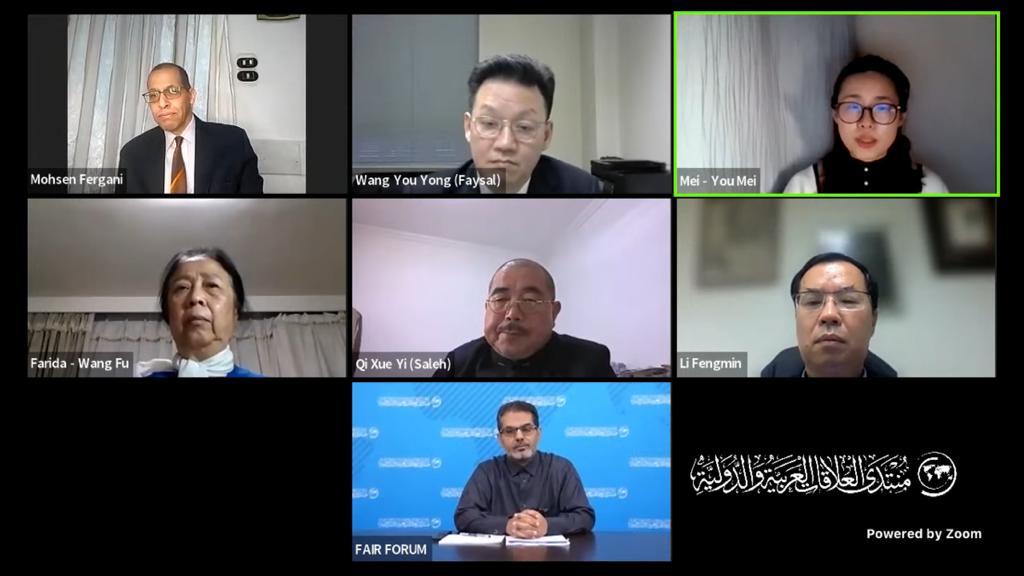
Qatar - 8th International Conference on Translation and Interculturalisation kicks off
Doha: The 8th International Conference on Translation and Problems of Interculturalisation, organized by the Forum of Arab and International Relations, kicked off yesterday via zoom with the participation of academics and translators from different countries of the world.
The conference was inaugurated by Riyadh Al Musaibili, a researcher at the Forum on Arab and International Relations, who spoke about the importance of the conference and its objectives as a cultural and intellectual forum for translators from all over the world.
The participants in the first session discussed the issue of Arabic translation from and into Chinese. The dialogue was moderated by Dr. Yu Mei, a professor at the College of Foreign Studies in Beijing, and it included five research papers.
The first was presented by Dr. Lin Fongmin, a professor of Arabic literature at Peking University and president of the Chinese Society for the Studies of Arabic Literature. In his paper, he dealt with“Translating Arabic Literature into the Chinese Language,” where he indicated that the oldest translation of Arabic literature into the Chinese language was in 1866, and it was Al-Burda of the Imam Al Busiri.
He spoke about the history of translation of Arabic literature in China through four stages, the first from 1866 to 1950, the second from 1950 to 1980, the third from 1980 to 2000, and then the last stage from 2000 until now.
He pointed to China's interest in establishing programs and departments to study Arabic language, which resulted in an impetus for translating a lot of Arabic creativity into the Chinese language, including novels, stories, poetry and prose. He pointed out that the most prominent works that were translated into Chinese were 'The Thousand and One Nights', the works of Gibran Khalil Gibran, and then the works of Naguib Mahfouz.
Wang Yuyong, professor of Arabic language and literature at Shanghai International Studies University, also spoke about translating Chinese culture into Arabic, while translations of Arabic from Chinese do not exceed 30 books. He called for joint efforts to Arabize the classics of Chinese culture to achieve greater understanding between the Arab and Chinese cultures.
In turn, researcher Chi Shui Yi, professor of Arabic at Northwest China University, whose interests are concentrated in Islamic heritage, presented a paper entitled“Islamic Religious Translation in China” in which he spoke about his personal experience and the translation of the meanings of the Qur'an that appeared completed for the first time in 1927, and it was a Japanese translation, then in 1931 an English translation.
After that, Muslims took over the translation of the meanings of the Qur'an, which has so far reached 17 translations, pointing out that some translations lack accuracy in expression. She mentioned that the best of these translations is the translation of Muhammad Makeen, which was characterized as being closer to the texts of the Qur'an, in a language that combines brevity and smoothness, in addition to accuracy and honesty in the performance of meaning.
The fourth paper was presented by Dr. Wang Fu, an expert in the Chinese National Council for Linguistic Works and an expert on Arabic projects at the Chinese Academy of Translation, and she has translated many Arabic books into Chinese. It dealt with the“translation of ancient Arabic poetry” and its most important problems.
Dr. Mohsen Ferjani, Professor of Chinese Language at Ain Shams University in the Arab Republic of Egypt, presented a paper entitled“Translating Chinese Literature into Arabic”, which dealt with the interest in Chinese literature in Arabic since the eighties of the last century, and the most important Chinese literary symbols that the Arabic translators were interested in.

Legal Disclaimer:
MENAFN provides the
information “as is” without warranty of any kind. We do not accept
any responsibility or liability for the accuracy, content, images,
videos, licenses, completeness, legality, or reliability of the information
contained in this article. If you have any complaints or copyright
issues related to this article, kindly contact the provider above.


















Comments
No comment